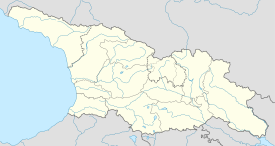Ilori Church
| Ilori Church of St. George ილორის წმ. გიორგის ეკლესია |
|
|---|---|

Ilori Church of St. George as illustrated by Cristoforo Castelli.
|
|
| Basic information | |
| Location |
Ilori, Ochamchira District, |
| Geographic coordinates | 42°41′46″N 41°29′59″E / 42.696111°N 41.499722°ECoordinates: 42°41′46″N 41°29′59″E / 42.696111°N 41.499722°E |
| Affiliation | Abkhazian Orthodox Church |
| District | Ochamchira District |
| Region | Caucasus |
| Country | Georgia |
| Status | Active |
| Architectural description | |
| Architectural type | Domed, single-nave |
| Architectural style | Georgian; Church |
| Completed | Early 11th century |
| Dome(s) | 1 |
The Church of St. George of Ilori (Georgian: ილორის წმ. გიორგის ეკლესია) is a Medieval, originally Georgian Orthodox Church in the village of Ilori, in the Ochamchira District of Abkhazia,Georgia. The Church was built in the first quarter of the 11th century, and represents one of the most important sites of western Georgian architecture. It is also considered one of the more significant religious locations of Medieval western Georgia. The building has a single-nave design.
During its long history, the church underwent several important architectural modifications and was repaired by Levan II Dadiani in the 17th century, only to be burnt down by Ottoman Turks in 1736. The building was eventually restored again by the Princes of Odishi in the latter half of the same century.
On 9 February 2011, the Abkhazian government transferred the church into the perpetual care of the Abkhazian Orthodox Church.
In 2010, the church underwent restoration. According to the Georgian government, this resulted in severe damage to the church's historic character. It accused the Abkhazian government of plastering parts of the exterior and the interior of the church that featured Georgian inscriptions and frescos, and of replacing the Georgian-style dome by a Russian-style one. The Georgian government called on international conservation organisations and in particular UNESCO to intervene.
Demur Bzhania, head of the Abkhazian Directorate for the Protection of Cultural Heritage, declared that the church's Priest had not coordinated the reconstruction with his office, and admitted that the placement of the dome would have to be corrected. However, he defended the whitewashing of the walls, claiming that the interior had not been touched and that old photographs of the church's exterior did not show any Georgian inscriptions or murals. According to head of the Abkhazian Orthodox Church Vissarion Aplaa, the church did not originally have a dome, and its historic character had first been affected when Georgian authorities placed a Georgian-style dome on top of it during the 1940s and 1950s. This dome had then collapsed during the 1992-1993 war Georgian-Abkhazian war, and now the local Priest had replaced it with a new dome to prevent water from entering the church.
...
Wikipedia

